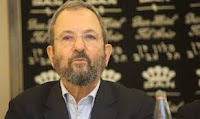Nadav Shragai..
Israel Hayom..
07 July '19..
Link: https://www.blogger.com/blogger.g?blogID=9005789597982574645#editor/target=post;postID=3572715414862987046
Ehud Barak, the man who pulled the wool over his electorate's eyes 19 years ago in what one of the most scandalous political flip-flops ever witnessed in our political arena, is now back in the ring and looking to regain our trust. As Israel's 10th prime minister, Barak in July 2010 agreed to divide Jerusalem and the Old City at the 2000 Camp David Summit. He has never expressed regret over the move.
Nor has he ever explained to the public how, just two months earlier, on the 33th anniversary of Jerusalem's unification, he declared at a ceremony at the city's Ammunition Hill that "only someone who does not understand the profound depth of total emotional attachment the Jewish people have for Jerusalem could even imagine the State of Israel conceding part of the city" and "only someone completely disconnected from the historical heritage, who is alienated from the vision of the people, the poetry of his life, his faith and the hope of his life - could even conceive of a concession … of a part of Jerusalem."
Just a few weeks later, he annulled his vow.
The damage incurred as a result of Jerusalem's division would be felt in countless arenas: Zionist, Jewish, historic, security and urban. But Barak delivered an even more fatal blow by breaking the taboo and the consensus on Jerusalem. He created the precedent that Israel would consent to Jerusalem's division, after which Prime Minister Ehud Olmert and his Foreign Minister Tzipi Livni, along with other ministers and lawmakers and mistaken parties that have gone astray were able to follow in his footsteps. And above all else, it served to raise the Palestinians' expectations to intolerable levels.
I remember myself in those days, hurt and in disbelief, standing in a crowd 300,000 strong opposite the walls of the Old City protesting against the proposed division. I also find it hard to forget how Barak's blunt attack on the Jewish people's psyche nearly led to its division and an uprising, and even threats of civil disobedience and refusals to obey orders, including from people who did not identify with the Israeli Right.
Figures such as former IDF Capt. Moti Ashkenazi, who led the protest movement following the 1973 Yom Kippur War, or jurist Meir Rosenne, who served as legal adviser to the Foreign Ministry, along with dozens of their colleagues, made it clear at the time that "Barak's concessions on the matter of Jerusalem will not obligate us, nor the State of Israel or the Jewish people in its entirety." They called his moves "patently illegal" and "an attempt to deceive the public and rob the Jewish people of its treasure." Barak even succeeded in getting former Supreme Court President Moshe Landau out of the woodwork. The former chief justice warned of the impending "collapse of the Jewish state and its assimilation in the surrounding space." Center party lawmaker Roni Milo, who resigned in protest of the Barak government, cautioned, "We will not be able to explain to ourselves, to strangers and our children, what we are doing here and what is our right to the land."
Barak's four coalition parties abandoned the government, leaving him with a minority government. When he tried, just days ahead of the 2001 election, to force a deal he had wholeheartedly railed against on the reality on the ground as well as on the Israeli public, even a sworn supporter of the two-state solution such as political scientist and Hebrew University professor Shlomo Avineri rejected the legitimacy of the 2001 Taba Summit aimed at enhancing "final status negotiations" to end the Israeli-Palestinian conflict.
Has Barak changed? Has he ever expressed remorse for his actions? The opposite is true. While addressing the Saban Forum on Middle East policy in Washington in December 2010, Barak reiterated his position that the partition plan for Jerusalem he proposed as prime minister would be his recipe for a final status agreement. The man who just two years ago threatened civil society's uprising against the policies, warning "hundreds of thousands of civilians will take to the streets to physically block" Prime Minister Benjamin Netanyahu's policies, is the real threat to democracy.
Now, more than ever, is the time to remind people of Barak's betrayal of the trust of his constituents and Jerusalem. Netanyahu may have frozen construction in Jerusalem and the settlements and avoided any action aimed at preventing a Palestinian takeover of Area C. The prime minister has also demonstrated weakness on the Temple Mount. But there is one line he has not crossed, and one must hope he will never cross – not even within the framework of Washington's so-called "deal of the century": failing to preserve the integrity of a unified and undivided Jerusalem. Barak crossed those red lines a long time ago. He must not be given another opportunity to divide and harm Jerusalem.
Updates throughout the day at http://calevbenyefuneh.
.

No comments:
Post a Comment